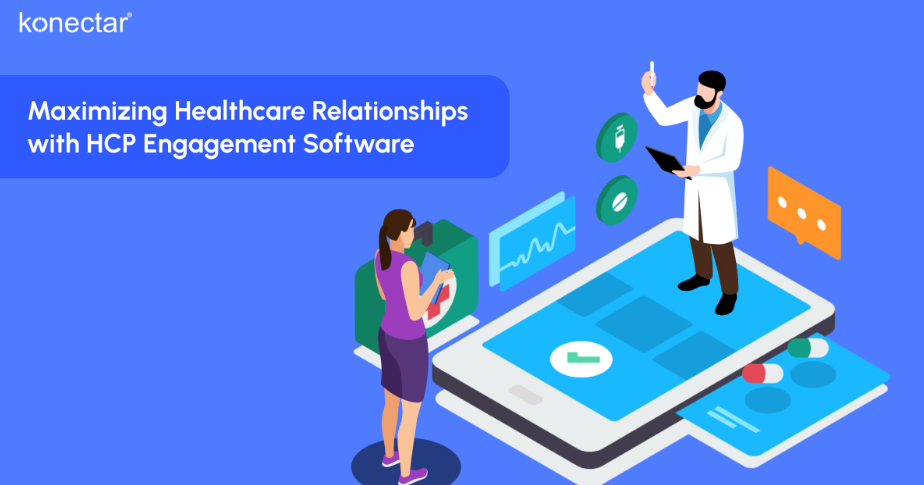HCP engagement software is a digital platform. Its primary function is facilitating interactions between life sciences companies and healthcare professionals (HCPs). In addition, it enhances the effectiveness of engagement efforts with HCPs.
This software is a central hub for collaboration, communication, and information sharing for all stakeholders.
Who uses HCP engagement software?
Pharmaceutical Companies
These organizations make use of engagement platforms to inform HCPs about new drugs and the latest information from clinical trials.
Medical Device Manufacturers
These organizations use engagement tools to educate HCPs about new devices and gather feedback.
Marketing and Sales Teams
These life sciences teams manage relationships and relay communications with HCPs. They also develop and distribute promotional materials and draft campaigns targeted at healthcare professionals.
What are the Features of HCP Engagement Software?
Personalization Capabilities
HCP engagement software enables organizations to tailor their communications to the particular needs and preferences of HCPs. Customization fosters stronger relationships and increases the effectiveness of communicated messages.
Personalized communication encourages HCPs to interact. It showcases that organizations understand and value the HCP’s unique role, challenges, and contributions.
Communicating the right message to the right person at the right time reduces information overload by filtering out irrelevant content.
Providing HCPs with specific resources for optimal care leads to better patient outcomes. Best clinical practices can be adopted with clear information sharing.
Omnichannel Collaboration
HCP engagement software allows for the integration of all communication channels to facilitate seamless interactions. Key aspects of omnichannel HCP engagement include:
- Integrated Communication Platform
There are several communication channels, all suited for one particular need. Channels like emails serve as a traditional way of distributing newsletters, ensuring all parties receive consistent information.
For more personalized communication, phone calls offer direct audio communication, allowing error-free dialogue. Video calls further enhance this communication with the added benefit of adding visual elements.
A mobile application encompasses all these features with the bonus of having information on the go. Recently, networking platforms like LinkedIn have allowed HCP digital engagement within the healthcare landscape.
- Collaborative Tools and Features
Shared calendars and scheduling meetings ensure all participants are synchronized. Additionally, the document-sharing capability allows HCPs to attach files, research papers, clinical data, and presentations for peer review. This software furthers collaborative efforts and invites contributions.
To further the spirit of collaboration, discussion forums provide a safe space for exchanging ideas, expertise, and problem-sharing.
Together, all these enhance the connection and facilitate better communication within the healthcare community.
- Real-Time Communication
Instant messaging and chatbots are useful functionalities that allow HCPs to engage in immediate conversations. Chatbots give quick and automated responses that help them make timely decisions.
Similarly, push notifications are useful because they dispense important information through alerts and updates. They are also crucial for the retention of users and increasing engagement efforts.
Data Analytics and Reporting
This feature collects, analyzes, and interprets data from interactions with HCPs. Key functionalities of data analytics include:
- Engagement Metrics
Activity monitoring includes email engagement (click rates, response time), event participation (registrations, attendance, and participation), and content interaction (whitepapers, case studies). HCP software tracks how often and which metrics are accessed.
- Behavioral Analysis
Techniques such as predictive modeling and journey mapping allow HCP software to predict behavior based on past iterations. They also visualize the HCP journey to highlight touchpoints and optimize engagement efforts.
- Performance Dashboards
One of the central features of engagement software is the visibility of HCP data. Real-time data visualization displays key performance indicators (KPI) for quick insights. Performance dashboards give a comprehensive, eagle-eyed view of the data.
- ROI Measurement
Campaign effectiveness can be judged effectively. Evaluating the return on investment helps in fine-tuning marketing campaigns and engagement initiatives. It also allows for change in resource allocation, if needed.
Compliance & Security Measures
HCP software is intuitive enough to check for regulatory compliance and alert users when irregularities are found. The sensitive and critical nature of healthcare warrants this functionality. In addition to compliance with the legal framework, consent management, and third-party data use compliance are also necessary.
Importance of Maximizing Healthcare Relationships
Stakeholders have differing outcomes that come from maximizing HCP relationships.
For Healthcare Sector
For the healthcare sector, the advantages of maximizing healthcare relationships are manifold. Here’s a look at some of them. They gain the following advantages:
- Increased Efficiency
The HCP engagement software comes with advanced features that help life sciences teams such as medical, clinical and sales to streamline HCP management processes. This helps to create a smoother workflow and minimize delays caused by bottlenecks. Strong interdepartmental collaboration speeds up decision-making, leading to a faster response rate. Additionally, collaboration prevents redundancy in efforts and resources.
- Reduced Costs
Traditional ways of HCP engagement are prone to data duplication and errors. This can be resource intensive and cause significant financial liability for life sciences companies. HCP engagement software provides teams with accurate insights into the healthcare landscape and helps to drive effective communication, thereby establishing strong foundational HCP relationships.
For Healthcare Professionals
Healthcare professionals gain different advantages, including:
- Timely Information
Easy access to the latest clinical research helps HCPs stay updated on medical advancements. This allows them to apply the most useful practices to patient care. Effective relationships lead to clear communication among primary care professionals and healthcare companies. It ensures that critical patient information is relayed quickly and accurately to implement timely interventions.
- Professional Growth
Continuing medical education (CME) is vital when it comes to healthcare professionals. The virtual engagement tools in the HCP engagement software allows healthcare teams to organize workshops, seminars, conferences. These events allow HCPs to participate actively, stay updated on the latest practices to improve patient outcomes, enhance professional networks and foster career growth.
Active participation in the healthcare community builds recognition, and an HCP can leverage that to enhance professional reputation.
For Patients
The advantages for patients include the following:
- Enhanced Care Experience
While an HCP engagement software may not have a direct impact on patients, it plays an important role in enhancing healthcare outcomes. HCPs provide direct feedback to pharma companies regarding therapeutic products, which are recorded in the platform and accessed by multiple departments across a company. This helps in gaining a deeper understanding of unique health needs, refining of the products, and enhancing care experience.
- Medication Safety for Better Health Outcomes
HCP engagement platforms enable teams to record any medical insights shared by HCPs such as adverse event reporting and safety concerns regarding medications. This real-time data exchange enables organizations to identify potential risks, facilitate timely investigation and update the treatment guidelines. This leads to improved prescribing practices and patient safety, which ultimately benefits patients.
Best Practices for HCP Engagement Software
Certain practices are essential to get the most out of engagement software. The following should be kept in mind while considering an HCP engagement software:
- Organizational Need
Before deciding on an HCP engagement software, a thorough analysis of an organization’s specific needs is a prudent step. This includes identifying critical pain points pharmaceutical companies need the software to address.
Another important thing to consider is stakeholder involvement. An engagement platform will be as efficient as the people involved in it. Inputs from IT specialists, healthcare specialists, and administrative staff must be involved while selecting engagement software.
A crucial aspect while deploying engagement software is also scalability. Considering the organization’s future growth, this software must accommodate increased user load and data handling.
- Choosing The Right Platform
Evaluating how the software’s functionality aligns with the organization’s needs will ensure a better fit. In addition, the platform’s interface will decide the training time, user adoption, and usage.
A good HCP engagement software will have user-friendly features that eliminate intense staff training and will take minimal time in user adoption.
- Staff Training
Given how complex engagement software has to be to meet the varying demands, initial and ongoing training is essential for the staff.
These training sessions can be further refined for specific roles and familiarity with these platforms. Deciding on key training metrics can help track training effectiveness, such as user competence, error rates while using software, etc.
- Monitor & Evaluate Performance
Clear metrics that give a comprehensive picture of the software’s effectiveness will help make an informed choice. These metrics include patient satisfaction, user efficiency, compliance rate, etc.
Insights from these metrics will continuously improve software usage. Adjustments can then be made accordingly in staff training or software customization.
Conclusion
HCP engagement software is an absolute necessity in our times. Advanced functionalities such as personalization, multichannel collaboration, data analytics, and reporting facilitate effective engagement, all while keeping compliance and security measures in mind.
Adopting such technology translates to increased efficiency and reduced costs for healthcare organizations. For healthcare professionals, this enables access to timely information and continued opportunities for professional growth. As for patients, they experience enhanced care and overall better health outcomes.
Implementing engagement software is more than a mere technological upgrade; it’s a strategic move toward scalability. The growing need for personalization solidifies the standing of engagement software in our healthcare landscape.






